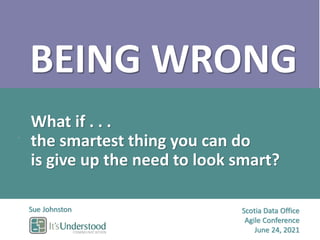Being Wrong
- 1. Scotia Data Office Agile Conference June 24, 2021 Sue Johnston BEING WRONG What if . . . the smartest thing you can do is give up the need to look smart?
- 2. “My idea is the best!”
- 3. My driving is . . . WORSE THAN AVERAGE AVERAGE BETTER THAN AVERAGE “illusory superiority”
- 5. Everyday routine Start car Scan the scene Stop when necessary Arrive Montreal summer Start car Encounter detour Decipher road sign Feel lost Deal with stress Get lost Replan
- 6. How can you tell a dog’s age? How do you know? Everybody knows!
- 7. Hear Evaluate Believe Hear Believe Evaluate How we think we think How we think
- 10. We need to be right
- 11. They tell me I’m smart I’m disappointing
- 14. Are you reasoning to be accurate?
- 15. Things go poorly, it’s luck, conditions, beyond our control Things go well, it’s our skill, good decision making “self-serving bias”
- 16. Every decision is a bet
- 17. “Agile approaches are universally applicable.” Want to bet? CAD 50.00?
- 18. Chosen Option Outcome A Outcome B Outcome C Outcome C What are the options? What do we know about each? What are the chances of each outcome?
- 19. What was the worst decision you made in the past year? What was the best decision you made in the past year?
- 21. How to make better bets
- 22. Needed: “positive” and “negative” capabilities •Knowledge •Skills •Competencies •Silence •Patience •Doubt •Humility
- 23. “We need to teach how doubt is not to be feared but welcomed. It's OK to say, "I don't know." Richard P Feynman Physicist and Nobel Laureate
- 24. Challenge your beliefs • How do you react at the edge of your knowledge? • What if you were not afraid to look incompetent? • When was the last time you said, “I don’t know?” • What’s a safe context to express “decent doubt?” • How could you test your assumptions? • How might you show yourself and others compassion when facing the unknown?
- 26. Probabilistic questions Probabilistic questions • What matters here? • What else might influence this? • What are the chances of this happening? • What makes us think that? • What’s our confidence level that this will happen? Courage and tact in equal measure
- 27. •Ask humble, genuinely curious questions •Challenge your own ideas – train yourself to test alternate hypotheses • Focus on accuracy • You might be wrong • Be open to diverse viewpoints •Work in groups – easier to see others’ biases than our own
- 28. “I have no special talent. I am only passionately curious.” Albert Einstein
- 29. “It doesn't matter how beautiful your theory is, it doesn't matter how smart you are. If it doesn't agree with experiment, it's wrong” Richard P. Feynman
- 30. • What’s likely to happen if you do X? • What’s your level of confidence? • How do you know? • What would need to be in place for that to work? • What else might be true? • How can you find out? • What are you not seeing? • Am I examining for discovery or for confirmation? • What biases might lead you astray? Curious questions
- 31. Use the team
- 32. This helps us build a better foundation for our bets
- 33. “You have never been in this exact moment before . . . so you don’t have to pretend that you know exactly what to do.”
- 34. Learn more Thinking In Bets - Annie Duke Thinking Fast And Slow - Daniel Kahneman Better By Mistake - Alina Tugend Being Wrong - Kathryn Shulz Not Knowing - Steven D’Souza/Diana Renner Humble Inquiry - Edgar Schein/Peter Schein The Advice Trap - Michael Bungay Stanier Leading Geeks - Paul Glen

